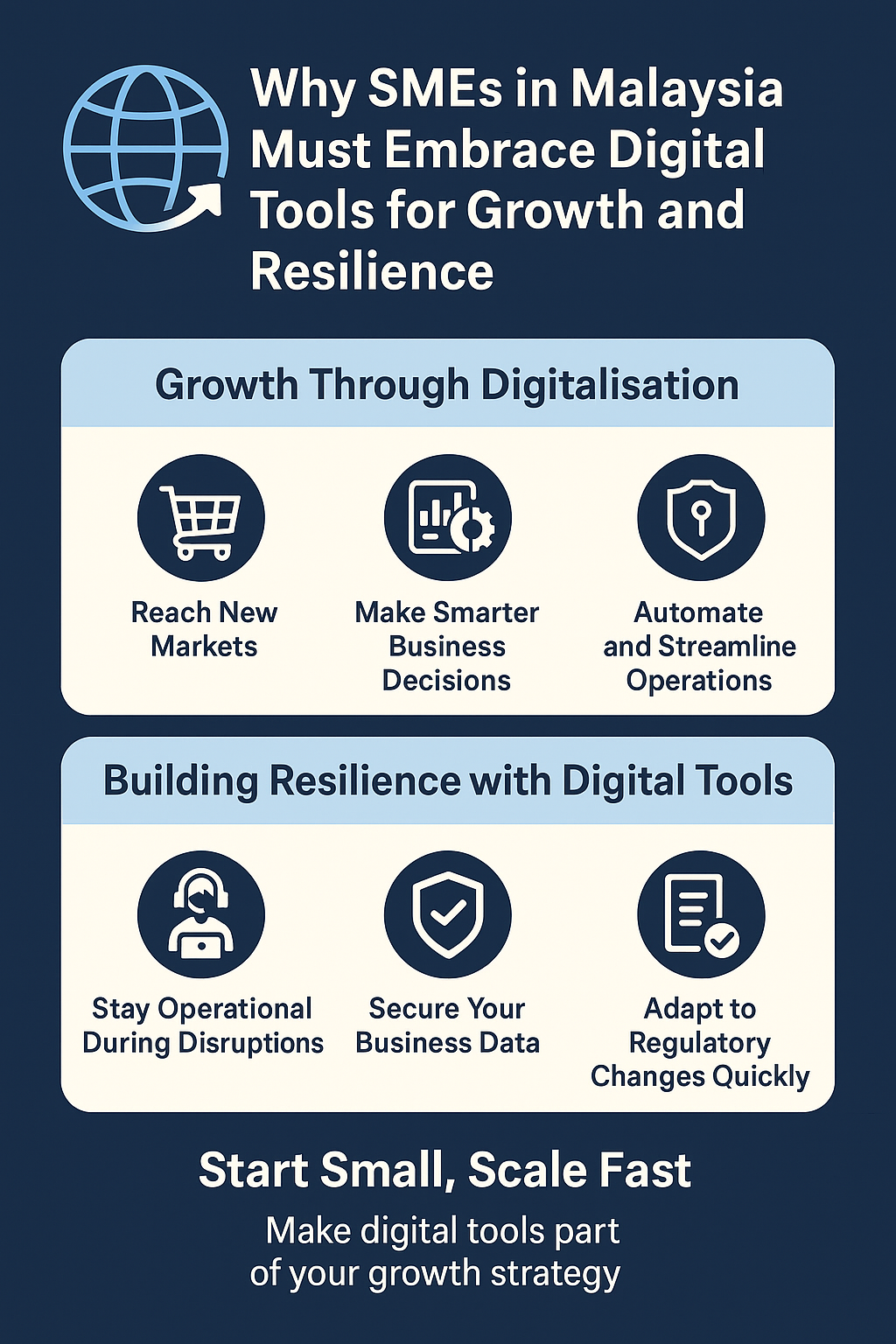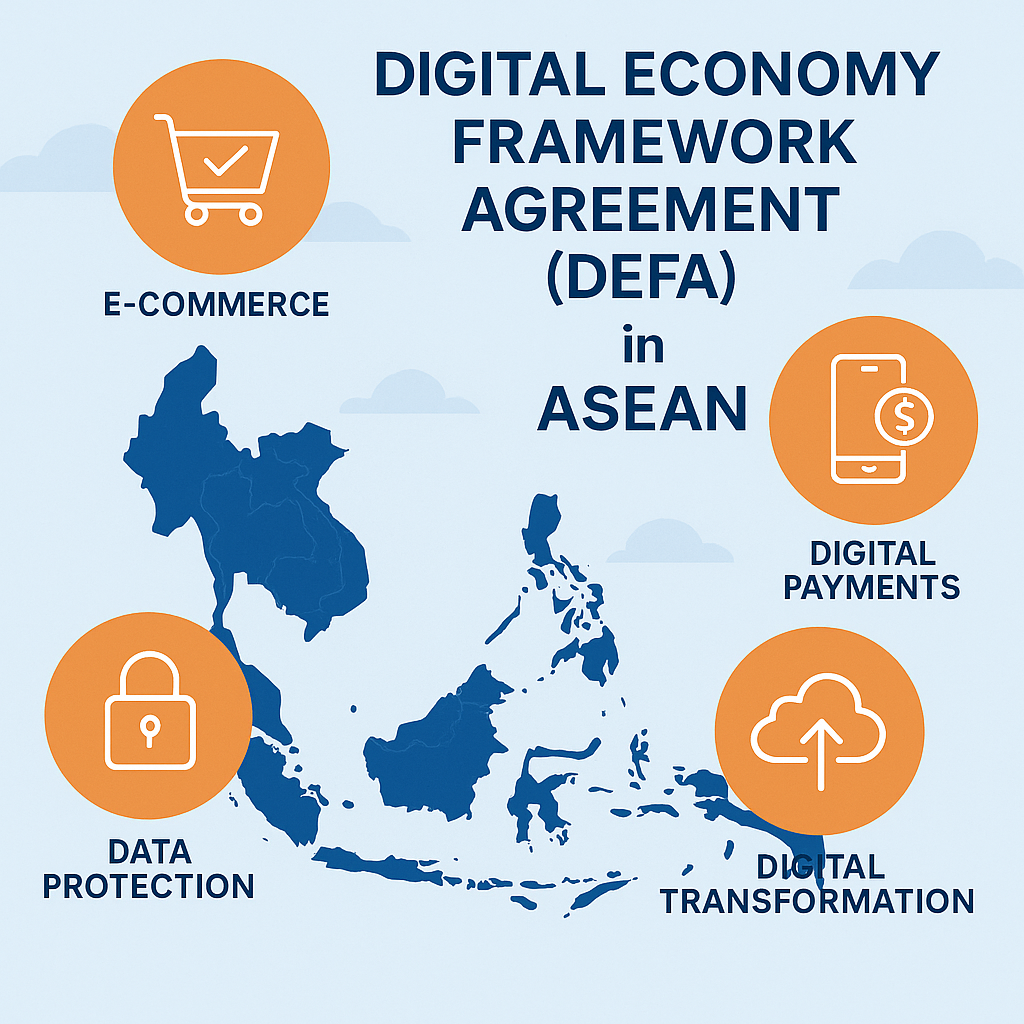This post is also available in:
Bahasa Malaysia
Understanding the Digital Economy Framework Agreement (DEFA) and How Small Businesses Can Benefit from Cloud Accounting and Payroll Solutions.
In today’s fast-moving digital world, small businesses in Malaysia cannot afford to stay behind. With the rise of the Digital Economy Framework Agreement (DEFA), the government is paving the way for a more connected, innovative, and competitive digital economy across ASEAN. What is DEFA and how does it directly impact, and benefit small businesses, especially those ready to adopt cloud-based accounting and payroll systems.
What is the Digital Economy Framework Agreement (DEFA)?
The Digital Economy Framework Agreement (DEFA) is a regional initiative under ASEAN to enhance digital trade and integration among member countries, including Malaysia.
It aims to create a seamless digital ecosystem by:
- Facilitating cross-border e-commerce
- Promoting digital payments
- Ensuring data protection and cybersecurity
- Supporting the digital transformation of businesses
For Malaysia, DEFA aligns with MyDIGITAL and the National Digital Economy Blueprint, which emphasize the need for SMEs to embrace digital tools for growth and resilience.
Why DEFA Matters to Small Businesses
DEFA is not just for big corporations. In fact, small and medium-sized enterprises (SMEs) stand to benefit the most through increased access to digital infrastructure, lower trade barriers, and government support for digital adoption.
Here’s how DEFA benefits SMEs:
- Simpler regional trade: DEFA promotes interoperability of digital systems across ASEAN, making it easier for small businesses to sell and operate across borders.
- Access to digital services: It encourages development of digital infrastructure, meaning more affordable and reliable cloud-based solutions.
- Stronger data security frameworks: SMEs can adopt digital tools with greater confidence that their data is protected.
Embracing Cloud Accounting and Payroll: A Smart First Step
One of the easiest and most impactful ways small businesses can embrace DEFA’s spirit is by adopting cloud accounting and payroll solutions. Here’s why it’s a game changer:
1. Real-Time Access to Financial Data
Cloud accounting gives you 24/7 access to your business data from anywhere. You no longer have to wait for end-of-month reports. This improves decision-making, especially when managing cash flow or planning expenses.
2. Compliance Made Easy
With tax and statutory requirements changing frequently (e.g., LHDN, EPF, SOCSO, EIS), cloud payroll solutions stay updated automatically, helping you remain compliant and avoid penalties.
3. Improved Efficiency and Accuracy
Manual data entry and paper-based systems are prone to errors. Cloud systems automate processes like payslip generation, leave tracking, and bank reconciliation, saving time and reducing mistakes.
4. Scalable for Growth
As your business grows, cloud systems can easily scale with you. Whether you’re hiring more staff or expanding to new markets, your systems stay aligned with your needs.
5. Enhanced Security and Backup
Cloud providers use encryption and secure backups, reducing the risk of data loss due to hardware failure or cyber threats.
How to Get Started
Assess Your Business Needs
Identify what you want to improve—bookkeeping, payroll, or both. Look for solutions that align with your industry and size.
Choose the Right Software
In Malaysia, popular options include Bukku, Xero, QuickBooks Online, and JustLogin. Compare features and costs.
Train Your Staff
Most platforms are user-friendly, but some basic training ensures smoother onboarding.
Consult an Advisor
Consider engaging a local consultant or accountant who is familiar with digital solutions and can help set things up properly.
Conclusion
The Digital Economy Framework Agreement marks a new chapter for businesses in Malaysia and across ASEAN. For small businesses, early adoption of cloud-based accounting and payroll systems offers a low-cost, high-impact path to digital transformation. It’s not just about keeping up—it’s about gaining a competitive edge in a connected, digital-first economy.
Now is the time to go digital. Let’s build smarter, faster, and more resilient businesses together.

Why SMEs in Malaysia Must Embrace Digital Tools for Growth and Resilience
In today’s fast-changing business environment, small and medium-sized enterprises (SMEs) in Malaysia face growing pressure to stay competitive, efficient, and adaptable. The COVID-19 pandemic, global supply chain disruptions, and rising customer expectations have all shown one thing clearly: businesses that embrace digital tools are more resilient and better positioned for growth.

The Impact of Unprecedented Technological Change on Small Business Finances
In recent years, the pace of technological innovation has accelerated at an unprecedented rate, disrupting industries and transforming the way businesses operate.
For small businesses, this rapid evolution is particularly significant in how they manage their finances.
